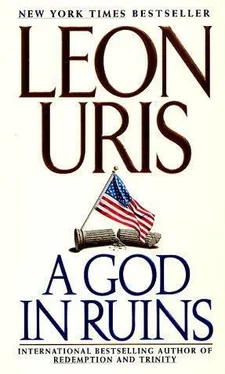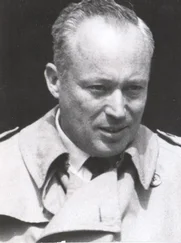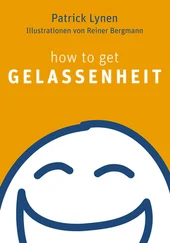“With your plant as our anchor,” Dwight retorted. “Look, fellows, we’ve also done our research. Nobody knows what you’re doing, including yourselves.”
No sun would burn off the haze this morning. They returned to the office.
“Give me a figure for your land. We’ll attach it to our parcels and get you, say, twenty percent of the total sale.”
At that moment Darnell and Thornton looked at one another, completely locked into each other’s brain. Thornton gave a tiny, tiny nod. Darnell was on. He picked up a Growler and handed it to Dwight.
“This little devil makes our Bulldog network totally secure.”
Dwight burped out a laugh, excused himself, and waved them off.
“The computer environment is now being invaded by every con artist, cross-dressing sicko, porno pervert, thief, monster banks, stock manipulator, secret arms and trade dealer,” Darnell said.
“And you boys must have God on your side,” Dwight mocked.
“In a manner of speaking,” Thornton said. “The First Union Bank of Providence, your bank, dips freely into ten numbered cocaine accounts and ‘reinvests’ through your building funds. Accurate records are hard to come by. You’ve got a sweet, clean seventeen percent skim-off.”
Dwight paled. Suddenly he was looking at a pair of young men, eager of purpose and filled with frightening information. He told himself to remain calm. After casting about for a reason, he realized there was no explanation.
“Are you going to blow the whistle on us?” Dwight asked.
“Of course not,” Thornton answered. “You’re just doing what any respectable bank would do. But get yourself a new security system.”
“Like the Bulldog and Growler,” Darnell said.
It was a fortunate day for Dwight Grassley. Thornton Tomtree and Darnell Jefferson had long envisioned the extent of their own greed. It was plenty, and it converted to the computer’s mistrust of the computer, or more succinctly, man’s mistrust of man.
First Union of Providence, their insurance company, and their real estate holdings used the initial Bulldog/ Growler network. It was filled with bugs, but no one could tap into its secrecy circuit.
Then came the Air Force after one of its most vital and secret networks had been broken into by a hacker.
Teams of geniuses in many universities and laboratories went into exercises with the Bulldog/ Growler each coming out with incredible praise of attaining absolute secrecy.
The greening of Thornton Tomtree began when a row of | bulldozers moved in to reclaim the land. The first building would house the mainframes, a pair of electronic wizards hand created by Thornton.
Darnell made certain that every set of tests was covered by the media. With much publicity, the system sold itself and there was soon a waiting list for installations. Darnell came up with the great name and logo, T3 Industries.
In a few years T3 Industries had set up networks for over a hundred industries listed in the Fortune 500.
If demand were to be met, manufacturing capacity had to be increased by several hundred percentiles. Flushed with a generous deal with T3, Dwight Grassley knew he had a cash cow, an endless, endless, endless cash cow. He even got rid of his drug-money accounts.
As the system built, Darnell Jefferson took it upon himself to push the parameters of Thornton’s personality. It was slow, mushy going. Meeting the press, using wit, building a comfort level into local business and fraternal lunches. Darnell brought in a speech coach, and Thornton responded, slowly. At first, when he went to the rostrum, there was an awkward dry-mouth trembling and jokes that lay flat. A mild beta blocker calmed his trembling. The challenge was great, and Thornton stuck it out and became reasonably proficient.
The more he spoke, the more those elusive thoughts would clear themselves in his mind and then on his lips. He began to toy with words and got a grip on what was humorous.
Thornton moved up to college commencements, guest appearances at
business and professional power conventions, and learned that stumbling
in mid-sentence could be endearing. A moment of trembling could make
the audience tremble,
his shy charm brought smiles, and that old humor, which he scarcely understood, made others howl with laughter.
Meanwhile, Darnell saw to it that Thornton’s appearances were plentiful and important.
Darnell understood immediately that this was another page being opened to him in the now-and-future Thornton Tomtree Book of Revelations. Why is he trying to get people to adore him? Darnell wondered. What was his curse, his sin, his burden? He did not seem to return the warmth but always positioned himself as the wise father figure.
One night at the ultraliberal and prestigious 92nd Street Y in Manhattan, everything fell into place. About three or four minutes into his speech Thornton realized the audience was mesmerized. He crossed the enormous chasm that made an ordinary speaker into a speaker who absolutely controlled his listeners: an orator, an actor.
To step down from the lectern and shove his hands in his pockets “home style,” to wipe his glasses or remark he’d lost his place, to relieve drama with a funny quip, to drop a curse word.
Well, Thornton was a sound sleeper, but he didn’t sleep for three days after the 92nd Street Y speech. He was top-of-the line, just a notch below Kissinger, as an attraction.
Expand they must. It was Darnell’s baby. The Pawtucket Central station would be a state-of-the-art home of two mainframes capable of transmitting and receiving tens of thousands of messages simultaneously.
A factory would make and assemble the computer and the encryption box. No employee worked on more than a fourth of a Growler. Another building would hold the research lab and the repair and installation division.
A final building was to be a modest four-story office.
Darnell brought Thornton all the blueprints, including some T3 had never seen.
“What the hell is this?” Thornton spread the last several sheets on his workbench. “Do I read this correctly? Employees Health and Recreation Center? This your idea of a whiz-bang knee slapper?”
“The architects,” Darnell answered, “and I hold no brief for architects, say that every progressive new factory has workout rooms, TV room, dance hall, and so forth and so forth.”
“This dispensary here looks like the Mass General Hospital.”
“Think in terms of the days we won’t lose to illness.”
“Bullshit! Quality restaurant, travel office, beach club, packaged tours .. . whatl A nursery for preschool children!”
Thornton ripped the pages from their moorings, tore them into six parts, crumpled them and put them into his wastebasket and lit a match to it.
“I take it you’re not in full agreement,” Darnell noted.
“This is fucking, and I mean fucking, socialism. Baby-sitters! We’ll end up with a Russian labor force, complete with a portrait of Lenin in the Comrades Meeting Hall.”
“You do know why I’m pushing this,” Darnell said.
“No, unless it’s to be your last words on earth.”
“I had to fight you like hell to skim off the best personnel in the country. We have the best. But you can’t pay a man a six figure salary to work in a junkyard. We have a golden opportunity to take future labor troubles off the table. The public relations aspects are dynamic. If they ever vote a union in here, if absenteeism doesn’t drop and production per worker doesn’t rise, I’ll kiss your ass in Macy’s window at the Thanksgiving Day Parade.”
“Not a single Republican CEO, which make up ninety percent of the CEOs worth their salt, will support this. You’re crazy if you think you can buy employee loyalty.”
Читать дальше












